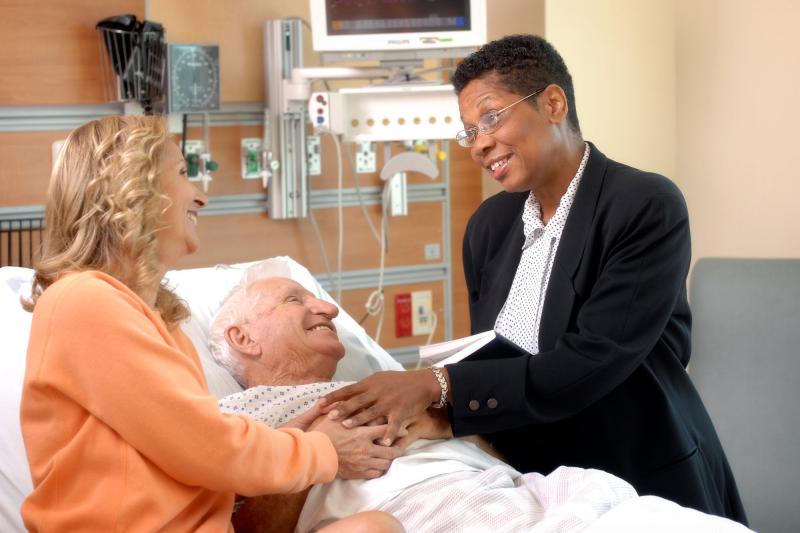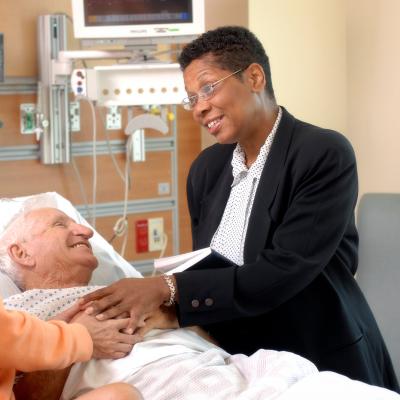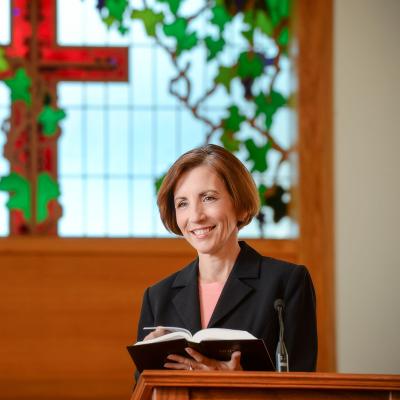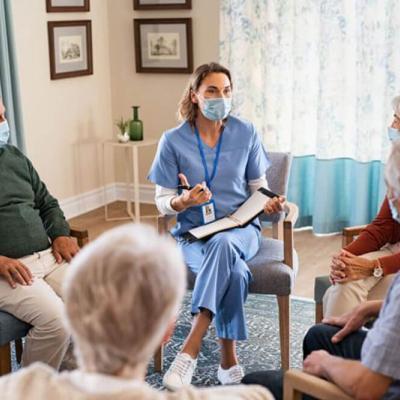- AdventHealth University

When people are hospitalized, their loved ones often want to know what they can do to help. Hospital chaplains provide spiritual and emotional support to patients and their families when they need it the most.
But what does a hospital chaplain do? And what is the essential role they play in a hospital? Let's take a closer look.
What Is a Hospital Chaplain?
A chaplain is a specially trained person who provides spiritual and emotional support to patients, families, and staff in a hospital setting. Chaplains come from a variety of backgrounds and faiths, so they can provide help to anyone, no matter what their beliefs may be.
Chaplains offer a listening ear and a shoulder to cry on, and they can also provide religious guidance or support if needed. They often offer comfort in times of crisis, and they can be a valuable resource for families coping with a loved one's illness.
The Roles and Responsibilities of a Hospital Chaplain
A Chaplain's role in a hospital setting is to provide spiritual and emotional support for patients and their families. They are not nurses or doctors, so they do not offer medical care. However, they can provide a listening ear, a shoulder to cry on, and a friend in a time of need.
Chaplains also provide support for hospital staff. They often lead prayer groups and offer comfort to those who have lost a patient. They help to create a sense of community in a chaotic setting and are an important link between patients and the medical staff.
What Training Do Hospital Chaplains Need?
Chaplains are theologically educated ministers. Many organizations seek chaplains with an advanced degree, such as a Master of Science in Spiritual Care, a master’s degree in divinity, or a similar degree. Graduate degrees prepare prospective chaplains for pastoral care in a variety of settings.
Chaplains are sometimes ordained ministers, but this is not always the case.
In addition to theological studies, chaplains undergo extensive training to provide spiritual care to patients and families. This may include training in psychology and counseling.
How Does a Hospital Chaplain Support Patients and Families?
A hospital chaplain provides spiritual and emotional support to patients and their families. As part of the health care team, they offer comfort and compassion to those who are dealing with illness, injury, or the death of a loved one.
Hospital chaplains are trained to listen and provide support without judgment. They can help patients and families process their feelings, make decisions, find hope, and cope with loss.
Chaplains are available to talk with patients and families of all faiths (or no faith) and can provide information about local religious resources. They can also arrange for religious services or rituals to be performed at the hospital.
Hospital chaplains are an essential part of the health care team, and their role is to support patients and families' emotional and spiritual needs.
Students Discuss Their Reasons for Pursuing a Hospital Chaplain Degree
“I wanted to be a better version of Brian, be a better leader, be a better father and husband,” says Brian Jones, Regional Director of Clinical Mission Integration for AdventHealth and a student seeking his Master’s Degree in Spiritual Care from AdventHealth University. In his 25 years with AdventHealth, Jones has served in a variety of roles, including Procurement Specialist, Patient Transport Manager, and Clinical Mission Integration Specialist. “I’ve always followed where God led me, so my career hasn’t been a conventional straight line. Along the way, I kept hearing from leaders that I had a special passion for our mission.” When the program opened in early 2021 at AHU, Jones felt called. “It was an answer to prayer. I had long wanted to continue my education. I was looking for something to complement my professional skillsets as well as my passion for our mission. This program has been such an affirming walk of faith.”
“I was done with my education. I never thought about going back to school,” says 63-year-old Teresa Peterson, a student seeking her Master’s Degree in Spiritual Care. “I knew this was what God was leading me to though.” Before “doing it all” at an AdventHealth Primary Care office, Teresa spent eight years as a nurse in a pediatric office and three years in long-term care. She enrolled in nursing school at Baker University at age 30 once her oldest child was in school, graduating when Teresa was 36.
She is completely satisfied with starting her career as a chaplain at age 65, immersing herself in courses like Grace and Law, the History and Role of Chaplains, and Spiritual Disciplines and Practice. “I think in healthcare, and this includes all religions, you have to care for the spiritual side of a patient. It’s more than the physical body. I think people forget there is a spiritual component. When people come into the office, whether it is a child in trouble or a breast cancer diagnosis, they want to know that someone cares for more than just the physical body. The patients become a part of your family after 16 years.
The compassion I have for my patients who are not at their best moments a lot of times is a big part of what I feel is missing in healthcare.”
How to Become a Hospital Chaplain
Many people who are called to ministry find that a hospital chaplaincy position is an excellent opportunity to provide spiritual care to people who need it most. If you are interested in becoming a Hospital Chaplain, our Master of Science in Spiritual Care program can be completed in as quickly as 3 years, all online.
Recommended Readings
How to Become a Chaplain
What Does a Hospital Chaplain Do?
Chaplain vs. Pastor: What’s the Difference?
Sources
Boston Globe Magazine, “Chaplains and the Rise of On-Demand Spiritual Support”
Healthcare Chaplaincy Network, People Want Spiritual Care Included in Their Health Care
Journal of Religion and Health, “Knowledge, Attitudes, and Interactions with Chaplains and Nursing Staff Outcomes: A Survey Study”
Related Pages
How to Become a Chaplain
What Does a Hospital Chaplain Do?
Chaplain vs. Pastor: What’s the Difference?
Online Master of Science in Spiritual Care
Spiritual Care Student Wants to Grow As a Healthcare Leader
Nurse Pursues Spiritual Care Degree to Become Chaplain


